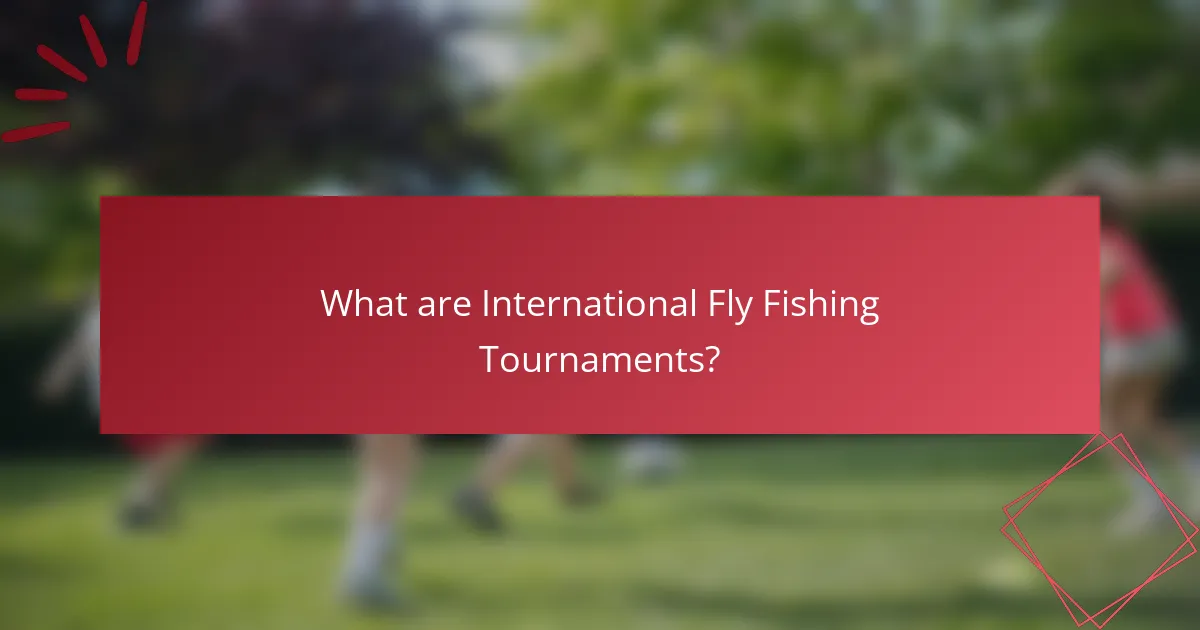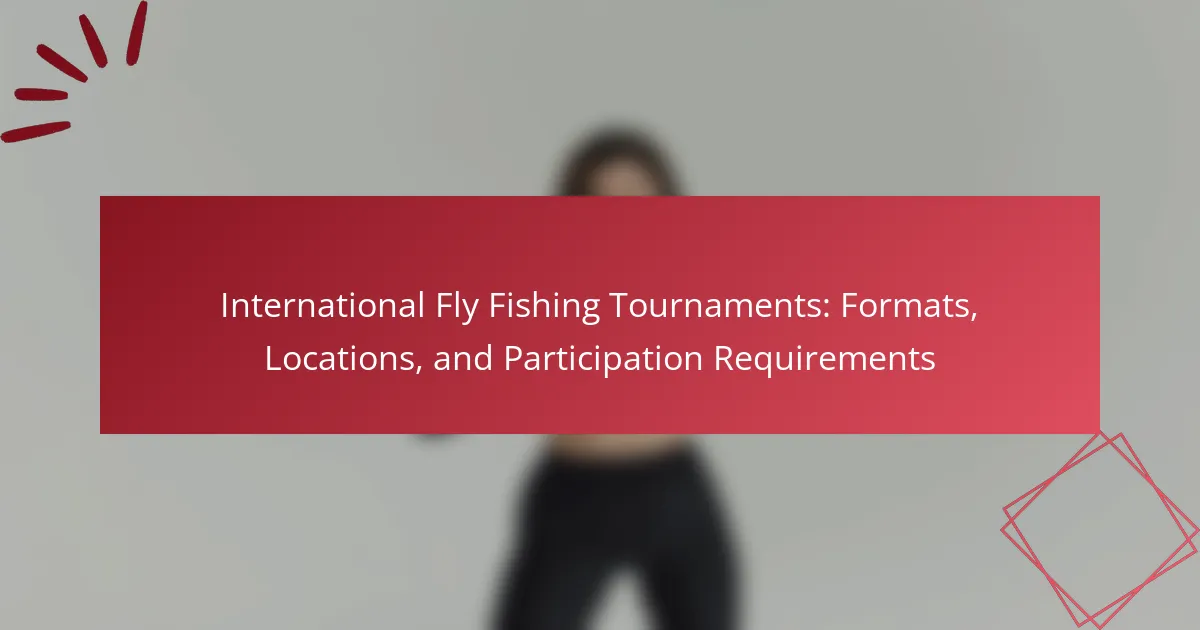International Fly Fishing Tournaments are competitive events where anglers from around the world engage in fly fishing under specific rules and formats. These tournaments focus on catching the largest or most fish within a set time limit, often taking place in renowned fishing locations. They promote skill development and camaraderie among participants, who must meet certain qualifying criteria, including experience levels and equipment standards. This article will explore the various formats of these tournaments, the diverse locations where they are held, and the participation requirements for anglers.

What are International Fly Fishing Tournaments?
International Fly Fishing Tournaments are competitive events where anglers from various countries participate in fly fishing. These tournaments often feature specific rules and formats that govern the competition. Participants aim to catch the largest or most fish within a designated time frame. Locations for these tournaments can vary widely, often held in renowned fishing spots. The events promote camaraderie and skill among international anglers. Many tournaments have qualifying criteria for participants, including experience levels and equipment standards. These competitions foster a global appreciation for fly fishing as a sport.
How do International Fly Fishing Tournaments differ from local events?
International Fly Fishing Tournaments differ from local events primarily in scale and participation. International tournaments attract competitors from various countries, increasing the level of competition. They often feature stricter regulations and standardized formats recognized globally. Local events tend to have more relaxed rules and focus on community engagement. The locations for international tournaments are typically renowned fishing destinations, enhancing their prestige. In contrast, local events may take place in smaller, less recognized areas. Additionally, international tournaments often offer larger prizes and sponsorship opportunities, which can attract elite anglers. Local events usually emphasize participation and enjoyment over competitiveness.
What unique characteristics define International Fly Fishing Tournaments?
International Fly Fishing Tournaments are characterized by their competitive nature and adherence to specific rules. These tournaments often feature a catch-and-release format to promote conservation. Participants typically employ fly fishing techniques, showcasing skill in casting and presentation. They are held in diverse locations, often in scenic rivers or lakes known for their fish populations. Each tournament may have unique entry requirements, such as qualifications or membership in fishing organizations. Scoring systems are used to evaluate participants based on the size and number of fish caught. Many tournaments also emphasize sportsmanship and ethical fishing practices. Events often attract international competitors, fostering a global community of fly fishing enthusiasts.
Why are these tournaments significant in the fly fishing community?
International fly fishing tournaments are significant in the fly fishing community because they foster competition and camaraderie among anglers. These events provide a platform for showcasing skills and techniques in a structured environment. Participants often gain valuable experience and knowledge through interaction with fellow anglers. Tournaments also promote conservation efforts by highlighting sustainable fishing practices. They can attract attention to local ecosystems, benefiting tourism and local economies. Additionally, these competitions often establish standards for fly fishing excellence, influencing practices worldwide. The community’s engagement in tournaments helps in building a strong network of passionate anglers dedicated to the sport.
What formats are commonly used in International Fly Fishing Tournaments?
International fly fishing tournaments commonly use formats such as catch-and-release and point-based scoring systems. Catch-and-release formats require anglers to catch fish and then release them back into the water. This method promotes conservation and sustainability within the sport. Point-based scoring systems award points based on the size and species of fish caught. Each species may have a different point value, encouraging diversity in catches. Additionally, some tournaments may include time-based formats where anglers compete to catch the most fish within a set time limit. These formats enhance competition and skill showcase among participants.
What are the different types of tournament formats?
The different types of tournament formats include individual, team, and league formats. Individual formats involve solo participants competing for the highest score. Team formats consist of groups working together to achieve a collective score. League formats feature ongoing competitions over a series of events. Each format has unique scoring systems and rules. For example, individual formats may use catch-and-release methods, while team formats often combine individual scores. These formats cater to various skill levels and preferences in fly fishing tournaments.
How do scoring systems vary across these formats?
Scoring systems in international fly fishing tournaments vary by format. In catch-and-release formats, points are awarded based on the size and species of fish caught. Each species has a designated point value, and anglers must measure and photograph their catches for verification. In comparison, in the total weight format, the score is based on the cumulative weight of all fish caught. This requires anglers to weigh their catches on certified scales. Additionally, some tournaments may implement a time-based scoring system, where the number of fish caught within a specific timeframe determines the score. These variations ensure diverse competition strategies and emphasize different skills among anglers.
What locations host International Fly Fishing Tournaments?
International fly fishing tournaments are hosted in various locations around the world. Notable locations include the United States, particularly in states like Montana and Colorado. Other prominent venues are found in New Zealand, known for its pristine waters and diverse fish species. The United Kingdom, especially Scotland, also hosts significant tournaments, leveraging its historical angling traditions. Additionally, countries like Canada and Australia are recognized for their scenic fishing spots that attract international competitors. Each of these locations offers unique environments, contributing to the global appeal of fly fishing tournaments.
What factors influence the selection of tournament locations?
Tournament locations are influenced by several key factors. Accessibility is crucial, as locations must be reachable for participants and spectators. The quality of fishing in the area significantly impacts selection. Regions with abundant fish populations attract more competitors. Local infrastructure, including accommodations and amenities, also plays a role. Weather conditions can affect fish behavior and participant comfort.
Additionally, the reputation of the location can enhance the tournament’s appeal. Environmental regulations must be considered to ensure compliance. Historical data on past tournaments can provide insights into successful locations. These factors collectively guide the decision-making process for selecting tournament sites.
How do different environments affect tournament conditions?
Different environments significantly affect tournament conditions in fly fishing. Environmental factors include water temperature, flow rate, and habitat structure. For instance, warmer water temperatures can increase fish metabolism, influencing their feeding behavior. High flow rates may make casting more challenging and affect fish accessibility. Additionally, varying habitats, such as rocky versus weedy areas, can determine fish species present and their catchability. Weather conditions, including wind and precipitation, also impact visibility and casting accuracy. Studies show that these environmental variables directly influence angler success rates and overall tournament outcomes.
What are the participation requirements for International Fly Fishing Tournaments?
Participation in International Fly Fishing Tournaments typically requires anglers to register in advance. Participants must adhere to the tournament’s specific rules and regulations. Most tournaments require a valid fishing license for the location of the event. Competitors often need to be members of recognized fishing organizations. Age restrictions may apply, with some tournaments allowing only adults. Participants may also need to provide their own fly fishing gear. Some events may require proof of previous tournament experience. Entry fees are usually required to cover event costs.
What qualifications must anglers meet to compete?
Anglers must meet specific qualifications to compete in international fly fishing tournaments. These qualifications often include being of a certain age, usually at least 18 years old. Participants may need to possess a valid fishing license in the tournament’s jurisdiction. Some tournaments require anglers to register in advance and pay an entry fee. Additionally, competitors must adhere to specific rules regarding equipment and fishing techniques. Many tournaments also mandate that anglers follow catch-and-release practices. Proof of previous competitive experience may be necessary for certain events. These qualifications ensure fair competition and adherence to conservation principles.
How do registration processes work for these tournaments?
Registration processes for international fly fishing tournaments typically involve several key steps. Participants must first visit the official tournament website to access registration forms. These forms usually require personal information, including name, contact details, and fishing experience.
Next, participants may need to pay a registration fee, which varies by tournament. Payment methods often include credit cards or online payment platforms. After submitting the registration form and payment, participants receive a confirmation email. This email usually contains important details about the tournament, including dates, locations, and rules.
Some tournaments may require additional documentation, such as proof of fishing licenses or prior tournament experience. It is essential for participants to complete these steps before the registration deadline, which is often several weeks before the event. Failure to register on time may result in disqualification from the tournament.
How can anglers prepare for an International Fly Fishing Tournament?
Anglers can prepare for an International Fly Fishing Tournament by researching the tournament rules and regulations. Understanding the specific guidelines is crucial for compliance. They should also practice casting techniques regularly to enhance their skills. Familiarity with the tournament location is important. Anglers should study local fish species and their behavior. Gathering the right gear is essential, including rods, reels, and flies suited for targeted species. Mental preparation is also key; anglers should visualize their strategies and outcomes. Finally, networking with experienced participants can provide valuable insights and tips for success.
What strategies can enhance an angler’s performance in tournaments?
Effective strategies to enhance an angler’s performance in tournaments include thorough preparation, understanding local conditions, and mastering techniques. Preparation involves practicing casting and knot tying to build confidence. Understanding local water conditions, such as temperature and current, can influence fish behavior. Mastering various fishing techniques, like dry fly and nymphing, increases versatility. Additionally, utilizing technology, such as fish finders and weather apps, aids in decision-making. Staying physically fit helps maintain endurance during long tournaments. Networking with experienced anglers can provide valuable insights. Research indicates that anglers who adapt their strategies based on conditions often perform better in competitive settings.
What common challenges do participants face during tournaments?
Participants in international fly fishing tournaments face several common challenges. One significant challenge is the varying weather conditions, which can affect fish behavior and fishing techniques. Another challenge is the level of competition, as participants often compete against highly skilled anglers. Additionally, participants may struggle with unfamiliar fishing locations, which can lead to difficulties in locating fish. Equipment issues, such as gear malfunction or improper tackle selection, can also pose challenges. Time constraints during tournaments can pressure participants to make quick decisions. Finally, adhering to tournament rules and regulations can be complex and may lead to disqualification if not followed correctly.
International Fly Fishing Tournaments are competitive events where anglers from around the world showcase their skills in fly fishing, adhering to specific rules and formats. This article covers the various tournament formats, including catch-and-release and point-based scoring systems, as well as the significant locations that host these events, such as the United States and New Zealand. It also outlines participation requirements, including registration processes and qualifications needed to compete, while discussing the unique challenges participants face during tournaments. Overall, the article emphasizes the importance of these tournaments in promoting conservation, camaraderie, and excellence within the global fly fishing community.
